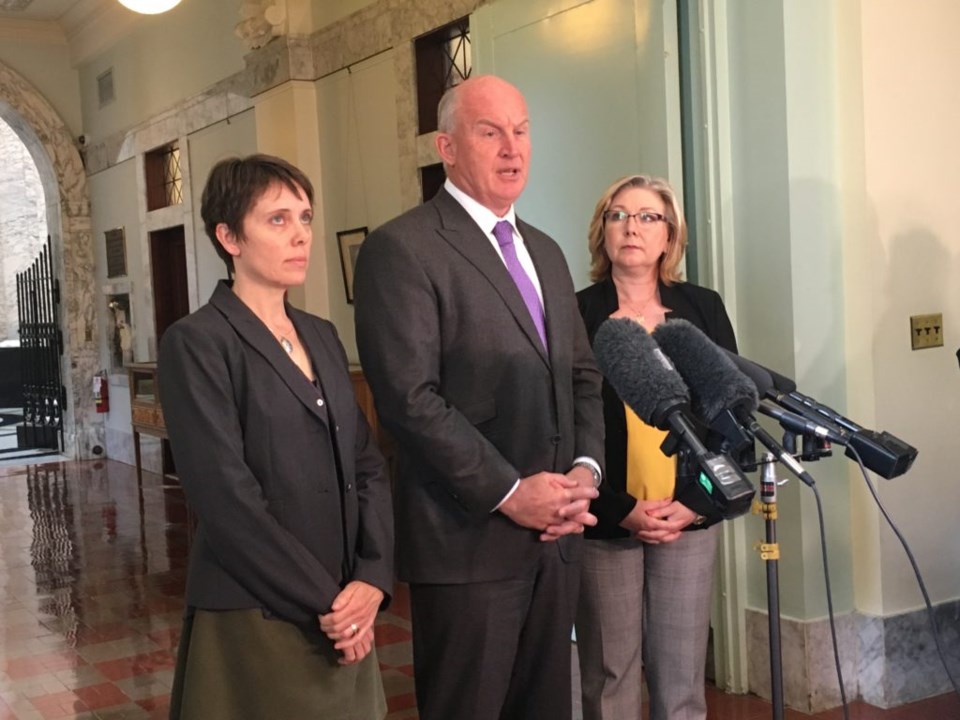Beverley McLachlin’s report into the BC Legislature spending scandal indicates Speaker Darryl Plecas was onto something – but also criticizes the way he handled it.
Now-former Clerk Craig James was found to have engaged in improper expense claims, creating benefits to his personal advantage, improperly removing alcohol from the legislature, and yes – keeping the now-infamous wood splitter at his house:
“Mr. James says he kept the wood splitter and trailer because there was no suitable place to store them on the Legislative precinct. I reject this explanation; it borders on nonsensical…It is hard to understand what was going through Mr. James’ mind. Was he generously protecting Legislative Assembly property at his own expense, or did he somehow think he was entitled to retain the equipment?”
The wood splitter understandably attracted much attention – an irresistibly and quintessentially Canadian story – but it’s worth pointing out it was comparatively small potatoes. One of the allegations McLachlin agreed was misconduct was a retirement allowance James obtained for himself of almost $268,000.
All told, of Plecas’ eight specific allegations against James, McLachlin found four constituted misconduct.
James immediately retired, effective immediately, and reached a “non-financial settlement” with the Legislative Assembly, the terms of which are not clear. He also issued a statement saying his extensive submissions should see the light of day, which will require a motion of the house; unlikely for the foreseeable future.
While it appears Plecas’ suspicions about James had some basis, McLachlin did not confirm any of his seven allegations against Sergeant-at-Arms Gary Lenz. (Similarly but perhaps less consequentially, MLA Linda Reid had been accused of “double-dipping” on travel expenses; McLachlin found that was not only false, but wasn’t particularly difficult to explain.)
Lenz was not found to have engaged in any misconduct at all. The worst thing everyone agrees definitely happened was one remark about travel. Plecas took it as further evidence of a cavalier attitude towards spending; McLachlin agreed it was an ill-advised comment to make at work, but probably not much more than an offhand remark or joke.
That said, Lenz isn’t quite in the clear. He remains on administrative leave, pending the results of other investigations; besides the auditor general’s ongoing audit, there are still two special prosecutors looking into…well, we’re still not certain what, exactly, despite previous promises all would be revealed this past February. And McLachlin only looked into the first of Plecas’ two (so far) reports.
Asked if he “felt vindicated,” Plecas demurred, saying there are still whistleblowers out there – and he’ll be vindicated when they are. (One wonders what he thinks of the NDP government’s ongoing attempts to dismiss their own whistleblower as a “sensitive caucus HR matter” unworthy of discussion.)

Plecas does deserve some credit: at the very least, the evidence suggests James made some irresponsible decisions, and that the Legislature’s reporting and approvals processes are inadequate – at best. He perceived these issues, and tried to do something about it. But not all “somethings” are created equal. McLachlin had some stinging criticism of Plecas’ management and subsequent investigation:
“He seemed to have seen his task as to build a credible criminal-type case against Mr. James and Mr. Lenz, rather than promptly confronting and correcting the administrative practices that he questioned. He focused on an investigatory line of inquiry at the expense of his duty to ensure that the affairs of the Legislative Assembly were properly administered on a current basis.”
In other words – you couldn’t have simply asked James and Lenz what they were doing?
McLachlin critiques Plecas’ handling of the investigation in several places. These include some simple errors; in one almost trivial example, Plecas said Lenz expensed a “fantasy novel” worth less than $15; McLachlin agreed with Lenz it was non-fiction and related to the history of one aspect of his job. It’s the kind of thing that should have been cleared up by just asking to actually see the book, instead of hiring a former Chief Justice of the Supreme Court to ask to actually see the book.
Taken individually, these seem to amount to misunderstandings – but by this time, Plecas was focused on compiling evidence, and operating under the assumption that Lenz (and James) was engaged in misconduct.
In this report at least, he was right half the time on James, but not once with Lenz. This is troubling considering Plecas floated the idea that Alan Mullen, the person investigating Lenz, should replace him as Sergeant-at-Arms.
Plecas’ most disturbing allegation was a wild conspiracy theory that Lenz and Deputy Sergeant-at-Arms Randall Ennis were “improperly planning to create a new position for a constable…so that he could continue to work” despite a degenerative health condition – and a plan for that constable to commit suicide while still employed so his beneficiaries would receive insurance.
You may want to let that sink in for a moment.
McLachlin found Plecas’ concerns and allegations were contradictory and unfounded, and almost certainly coloured by his growing distrust of Lenz. At one point, she seems to implore him to think things through:
“Finally, I note the Speaker’s twin concerns appear to be in tension with one another.”
With more reports coming, there will be more to this story. But in the meantime, Plecas deserves some credit for seeing a problem – but also criticism for his single-minded focus on it, seeing it everywhere he looked, and the way it was handled.
Maclean Kay is Editor-in-Chief of The Orca


